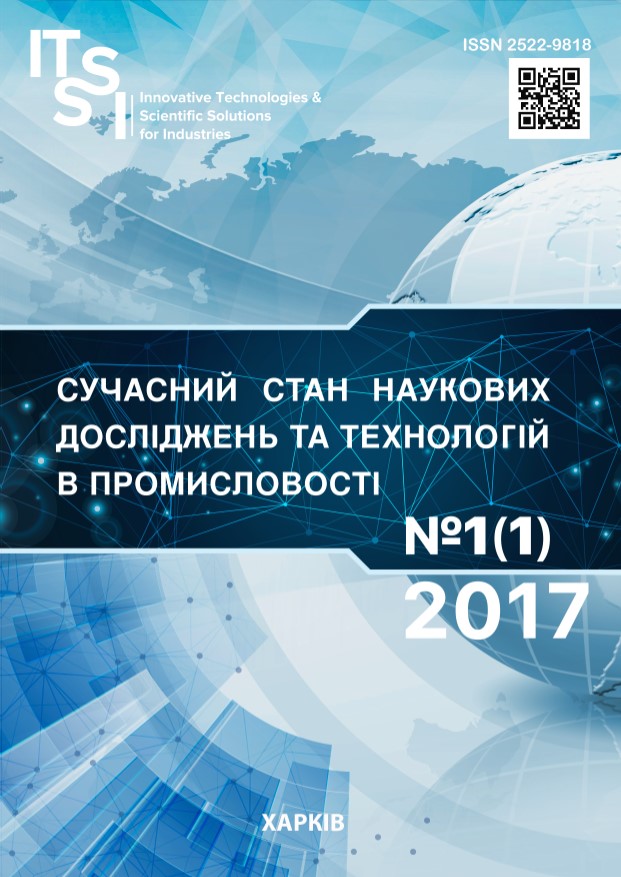FORMALIZING THE PROBLEM OF A PROJECT TEAM BULDING BASED ON THE UTILITY THEORY
DOI:
https://doi.org/10.30837/2522-9818.2017.1.053Keywords:
a project team building, utility function, multi-criteria optimizationAbstract
The subject matter of the article is mathematical models for solving particular problems of sorting out candidates for a project team. The aim is to create a region of compromises for a variety of particular criteria for selecting candidates and to develop an integral optimization function as a utility function for selecting preferred alternatives. The tasks are: developing the approximate area of compromises for solving single-criterion optimization problems; selecting the utility function of partial criteria; using general principles of utility theory application for solving personnel problems; sorting out the best option on the ground of multi-criteria evaluation and optimization methods; defining the degree of particular criteria importance; analyzing the peculiarities of multi-criteria assessment of problems in human resource management. The methods used are: multi-criteria assessment and optimization methods, utility function. The following results are obtained. The problem of estimating the relative importance of particular criteria in the utility function is considered. The procedure of determining the approximate region of compromises is described with account of a number of personal and psychological characteristics by successive solving single-criterion optimization problems for each particular criterion. The problem of developing the integral multi-criteria function for selecting preferred alternatives is considered. The peculiarities of using general principles of utility theory for personnel problems solving are analyzed. The function of multi-criteria optimization as a utility model for partial criteria is formulated. The general task of assessing and producing labour force with account of professional, personal and psychological properties of a candidate is formulated. Conclusions. The task of building a project team is considered in the article. The stages of team building are considered. The procedure for determining the approximate region of compromises is described with account of a number of personal and psychological characteristics by successive solving single-criterion optimization problems for each particular criterion. The function of multi-criteria optimization is formulated as a utility model for partial criteria. The method for selecting and evaluating personnel for planned projects is suggested on the basis of the procedure for sorting out candidates for a new project team from the workers who were previously involved in similar projects.References
Sidorenko, A. V., Marchenko, E. M. (2016), "Personnel management tasks in the development and implementation of the project", Economics and management in the XXI century: development trends ["Zadachi upravlenija personalom pri razrabotke i realizacii proekta", Jekonomika i upravlenie v XXI veke: tendencii razvitija], No. 27, pp. 99-102.
Kosenko, N. V., Artyukh, R. V. (2016), "Automation methods of evaluation, selection and team building project on the basis of characteristics set", Systems of control, navigation and communication ["Avtomatyzatsiya metodiv otsinky, vidboru ta formuvannya komandy proektu na pidstavi mnozhyny kharakterystyk", Systemy upravlinnya, navihatsiyi ta zv"yazku], No. 2 (38), pp. 104-107.
Rozhkov, M., Cheung, B., Tsui, E. (2013), Project Context and its Effect on Individual Competencies and Project Team Performance, International Conference on Intellectual Capital and Knowledge Management and Organizational Learning, Academic Conferences International Limited, 602 p.
Baykasoglu, A., Dereli, T., Das, S. (2007) "Project team selection using fuzzy optimization approach", Cybernetics and Systems: An International Journal, Vol. 38, No. 2, pp. 155-185.
Fedorchenko, S. G., Dolgov, Ju. A., Kirsanova, A. V., Mencher, Je. M., Pomjan, S. V., Nizhegorodova, M. V., Andrianova, E. I., Koloskova, E. V., Kolegov, A. V., Bashkatov, A. M. Fedorchenko S.G. (ed.) (2011), Generalized utility function and its applications, publishing house of Transnistria University, Tiraspol, 196 p.
Horlachuk V., Yenal'yev M. (2013), "The development of the theory of expected utility", Economist ["Rozvytok teoriyi ochikuvanoyi korysnosti", Ekonomist], No. 3, pp. 49-50.
Mikoni, S. V. (2013), "Estimation of utility alternatives as the final stage of their multicriteria optimization" Proceedings of SPIIRAS ["Ocenivanie al'ternativ po poleznosti kak zavershajushhij jetap ih mnogokriterial'noj optimizacii", Trudy SPIIRAN], Vol. 8, No. 31, pp. 6-19.
Kosenko, N. V. (2012), "Formalized representation of the task of forming a project team", Systems of control, navigation and communication: scientific research journal Central Scientific - Research Institute of Navigation and management ["Formalizovannoe predstavlenie zadachi formirovanija proektnoj komandy", Systemy upravlinnya, navihatsiyi ta zv"yazku: zbirnyk naukovykh prats' Tsentral'noho naukovo – doslidnoho instytutu navihatsiyi i upravlinnya], Kyiv, No. 3 (23), pp. 138-141.
Dotsenko, N. V., Kosenko, N. V. (2012), "Comparative identification of the parameters of the multifactorial estimation model", Systems of control, navigation and communication: scientific research journal Central Scientific - Research Institute of Navigation and management ["Komparatornaja identifikacija parametrov modeli mnogofaktornogo ocenivanija", Systemy upravlinnya, navihatsiyi ta zv"yazku: zbirnyk naukovykh prats' Tsentral'noho naukovo – doslidnoho instytutu navihatsiyi i upravlinnya], Kyiv, Vol. 2, No. 1 (21), pp. 140-143.
Downloads
How to Cite
Issue
Section
License
Copyright (c) 2018 Nataliia Kosenko, Iryna Kadykova, Roman Artiukh

This work is licensed under a Creative Commons Attribution-NonCommercial-ShareAlike 4.0 International License.
Our journal abides by the Creative Commons copyright rights and permissions for open access journals.
Authors who publish with this journal agree to the following terms:
Authors hold the copyright without restrictions and grant the journal right of first publication with the work simultaneously licensed under a Creative Commons Attribution-NonCommercial-ShareAlike 4.0 International License (CC BY-NC-SA 4.0) that allows others to share the work with an acknowledgment of the work's authorship and initial publication in this journal.
Authors are able to enter into separate, additional contractual arrangements for the non-commercial and non-exclusive distribution of the journal's published version of the work (e.g., post it to an institutional repository or publish it in a book), with an acknowledgment of its initial publication in this journal.
Authors are permitted and encouraged to post their published work online (e.g., in institutional repositories or on their website) as it can lead to productive exchanges, as well as earlier and greater citation of published work.














